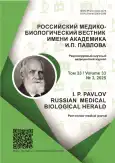Dynamics of the number of myocyte nuclei in muscle portions of arterial and venous homograft walls during long-term preservation
- 作者: Kalinin R.E.1, Suchkov I.A.1, Karpov V.V.1,2, Shvalb A.P.3, Guzairov D.V.1, Cherdantseva T.M.1
-
隶属关系:
- Ryazan State Medical University
- Regional Clinical Hospital
- Regional Clinical Tuberculosis Dispensary
- 期: 卷 33, 编号 3 (2025)
- 页面: 345-360
- 栏目: Original study
- URL: https://bakhtiniada.ru/pavlovj/article/view/327195
- DOI: https://doi.org/10.17816/PAVLOVJ678783
- EDN: https://elibrary.ru/BIYONU
- ID: 327195
如何引用文章
详细
INTRODUCTION: An important issue of use of freshly prepared homograft’s in the reconstructive vascular surgery is the maximal length of their preservation for safe application. Histological examinations are required.
AIM: To determine the optimal timing of the use of homograft’s based on the dynamics of the number of myocyte nuclei of muscle portions of arterial and venous homograft walls preserved in RPMI 1640 solution with the addition of gentamicin and fluconazole at a temperature of +4°C.
MATERIALS AND METHODS: The study of arterial and venous homograft’s from a posthumous donor was performed in compliance with the rules for collecting organs and tissues. The homograft’s were preserved in RPMI 1640 solution with the addition of gentamicin (400 μg/ml) and fluconazole (20 μg/ml) at a temperature of +4°C. At intervals of 7 days up to 84 days, sections of the arterial and venous grafts were cut out and fixed in formalin. Then glass slides were prepared. A total of 120 arterial and 120 venous samples were studied. The number of myocyte nuclei in 0.01 mm2 muscle portions of the walls was estimated.
RESULTS: On day 42, a decrease in the number of myocyte nuclei in arterial homograft’s by 56% was recorded relative to the values of day 7 (p = 0.003), a decrease in the number of myocyte nuclei in venous homograft’s by 55% (p = 0.024); a decrease in nuclei was also recorded at all subsequent control points.
CONCLUSION: The optimal period for the use of arterial homograft’s can be considered the period of preservation in RPMI 1640 solution for up to 21 days. Venous homograft’s can be used for up to 42 days, despite the decrease in the number of myocyte nuclei after 35 days, since there is no edema of the venous homograft wall until the end of the 42 day.
作者简介
Roman Kalinin
Ryazan State Medical University
Email: kalinin-re@yandex.ru
ORCID iD: 0000-0002-0817-9573
SPIN 代码: 5009-2318
MD, Dr. Sci. (Medicine); Professor
俄罗斯联邦, RyazanIgor Suchkov
Ryazan State Medical University
Email: suchkov_med@mail.ru
ORCID iD: 0000-0002-1292-5452
SPIN 代码: 6473-8662
MD, Dr. Sci. (Medicine), Professor
俄罗斯联邦, RyazanVyacheslav Karpov
Ryazan State Medical University; Regional Clinical Hospital
编辑信件的主要联系方式.
Email: sdrr.s@yandex.ru
ORCID iD: 0000-0001-5523-112X
SPIN 代码: 6245-6292
MD, Cand. Sci. (Medicine)
俄罗斯联邦, Ryazan; RyazanAlexander Shvalb
Regional Clinical Tuberculosis Dispensary
Email: shvalbalik@yandex.ru
ORCID iD: 0000-0001-8563-0439
MD, Cand. Sci. (Medicine)
俄罗斯联邦, RyazanDmitry Guzairov
Ryazan State Medical University
Email: sdrr@mail.ru
ORCID iD: 0009-0002-1943-2244
SPIN 代码: 3501-8157
俄罗斯联邦, Ryazan
Tatyana Cherdantseva
Ryazan State Medical University
Email: cherdan.morf@yandex.ru
ORCID iD: 0000-0002-7292-4996
SPIN 代码: 3773-8785
MD, Dr. Sci. (Medicine), Professor
俄罗斯联邦, Ryazan参考
- Harlander–Locke MP, Harmon LK, Lawrence PF, et al. The use of cryopreserved aortoiliac allograft for aortic reconstruction in the United States. J Vasc Surg. 2014;59(3):669–674. doi: 10.1016/j.jvs.2013.09.009
- Kalinin RE, Suchkov IA, Karpov VV, et al. The First Experience of Using Allografts in Surgery of Main Arteries of Lower Limbs. Russian Sklifosovsky Journal “Emergency Medical Care”. 2020;9(3):442–448. doi: 10.23934/2223-9022-2020-9-3-442-448 EDN: IZFWQX
- Pokrovsky AV, Dan VN, Chupin AV, Gryaznov OG. The use of biological transplants in the femoral-popliteal-tibial position. Angiology and Vascular Surgery. 1996;(3):91–100.
- Chakfé N, Diener H, Lejay A, et al. Editor's Choice — European Society for Vascular Surgery (ESVS) 2020 Clinical Practice Guidelines on the Management of Vascular Graft and Endograft Infections. Eur J Vasc Endovasc Surg. 2020;59(3):339–384. doi: 10.1016/j.ejvs.2019.10.016 EDN: MKKSRL
- Kalinin RE, Suchkov IA, Egorov AA, et al. Permanent vascular access for hemodialysis using allogeneic vein. Russian Journal of Cardiology and Cardiovascular Surgery. 2021;14(1):98–103. doi: 10.17116/kardio20211401198 EDN: BXCVKF
- Kalinin RE, Suchkov IA, Karpov VV, Egorov AA. Potentials of Using Allografts in Surgical Treatment of Popliteal Artery Aneurysms. I.P. Pavlov Russian Medical Biological Herald. 2022;30(1):115–122. doi: 10.17816/PAVLOVJ76343 EDN: HZXZBU
- Dmitriev OV, Italiantsev AYu, Chernovalov DA, et al. Prosthetic repair of the aorta with a cadaveric homograft for infection of bifurcated synthetic vascular prosthesis. Angiology and Vascular Surgery. 2021;27(3):132–139. doi: 10.33529/ANGIO2021315 EDN: SJKLSV
- Dmitriev OV, Ital'iantsev AYu, Chernovalov DA, et al. The use of an aortic allograft in infection of an aortic prosthesis in a patient with a multi-storey lesion of the arterial bed of the lower extremities. Grekov's Bulletin of Surgery. 2023;182(4):53–59. doi: 10.24884/0042-4625-2023-182-4-53-59 EDN: FRIXHY
- Khomchuk IA, Kurilov AB, Platonov SA, et al. Extraanatomical surgical treatment of infection of the bifurcation aortic vascular prosthesis using cadaveric arteries. The Journal of “Emergency Surgery” named after I.I. Dzhanelidze. 2023;(2):56–61. EDN: PPBTVM
- Bogomolova IN, Bogomolov DV. Prizhiznennyy nekroz i posmertnyy autoliz: problema differentsial'noy diagnostiki. In: Avdeyev AI, Yevseyev AN, Vlasyuk IV, editors. Izbrannyye voprosy sudebno-meditsinskoy ekspertizy i patologicheskoy anatomii; Khabarovsk, 01 January – 31 December 2012. Khabarovsk; 2012;(12):25–31. (In Russ.) EDN: XNVJQL
- Strukov AI, Serov VV. Pathological anatomy. 5th ed. Moscow: Litterra; 2012. (In Russ.)
- Kalinin RE, Suchkov IA, Karpov VV, et al. Features of the morpho-histological picture of homografts in different periods of conservation. Clinical and Experimental Surgery. Petrovsky Journal. 2023;11(4):75–82. doi: 10.33029/2308-1198-2023-11-4-75-82 EDN: OQMJXT
- Muhamadeev IS, Friend GG, Berezina IA. The evaluation of arterial and venous allografts’ viablity in vitro depending on the period of preservation. Morphological Newletter. 2007;(1–2):197–201. EDN: MJCNOJ
补充文件























